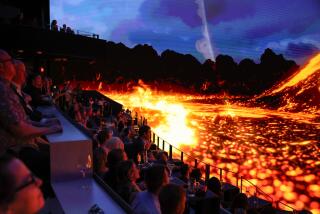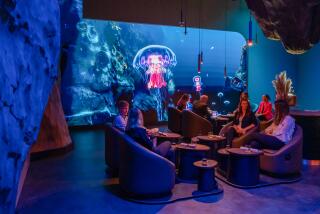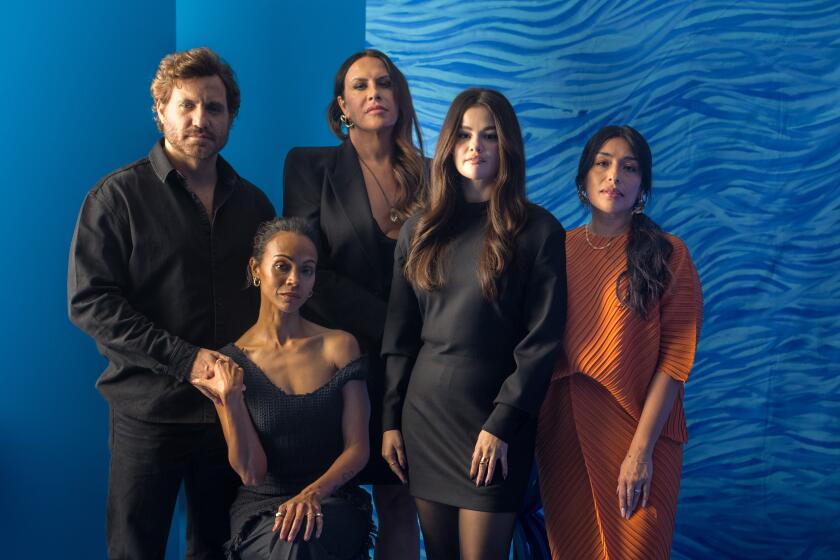A virtual-reality adventure inspired by ‘The Martian’ is about to be unveiled at CES
Many people who watched the Ridley Scott film “The Martian” in theaters this fall were struck by the scope and immediacy of hero Mark Watney’s world.
Some executives at 20th Century Fox, though, had a different idea on how to make the Red Planet visceral: Offer it up in virtual reality.
Now the studio’s digital-minded Fox Innovation Lab has created “The Martian VR Experience,” a set of episodic first-person adventures culled from the movie and lightly layered with a level of interactivity.
See more of Entertainment’s top stories on Facebook >>
The studio is formally announcing the piece Tuesday ahead of an unveiling at the International Consumer Electronics Show later this week in Las Vegas. It will then make the film available for an as-yet-undetermined price on the Oculus Rift, the first generation of which consumers can begin pre-ordering Wednesday and, when they debut later in the year, Sony PlayStation VR and HTC’s Vive headsets.
Hovering between passive cinematic experience and active video-game adventure, the new “Martian” film is among the most ambitious VR projects undertaken by a Hollywood studio.
With shiny production values, a top-tier director (“Maleficent’s” Robert Stromberg) and a plan to charge consumers, it is also one of the most fraught.
“We wanted the experience to end with the emotion you have watching the film, or even to surpass it,” said Ted Gagliano, Fox’s president of postproduction and a key Lab figure, as he sat with Stromberg and other Fox executives in the Lab’s offices on the studio lot recently. “We want Mark’s journey to feel like your journey.”
As dedicated virtual-reality headsets begin their first consumer rollout in 2016, the medium has brought with it a wealth of potential for Hollywood. VR places viewers in the middle of a story and enhances its immersiveness, a holy grail for film and television producers.
We want Mark’s journey to feel like your journey.
— Ted Gagliano, Fox’s president of postproduction
At the same time, VR has required that creators make tough calls on a wide range of issues, including the originality of the content and the degree of control they afford the viewer.
“The Martian VR Experience” seeks to find a careful balance on many of these questions, serving up familiar characters and environments but in a way consumers have yet to experience.
Near the start of the approximately 25-minute film, viewers zoom in on a wounded Watney as he removes shrapnel from his spacesuit, a more tangible experience than a corresponding scene in the traditional movie. The perspective then shifts to first person, and viewers inhabit Watney, capable of moving their hands and eyes in a way that registers in the experience.
In one scene in the Hab shelter, the user-as-Watney can fling potatoes; outside on Mars’ surface, the viewer can steer a rover to an important rendezvous point. And, in the piece’s finale, the user launches off the planet in a battered capsule to meet the mothership — a kind of “Complete Works of the Martian Abridged (and in VR).”

The experience relies on the movie’s device of Watney broadcasting back to Earth, with a computer-screen Matt Damon looking back at the viewer in the VR film in some scenes. An instructional voice-over from the rescue ship, recorded for the experience by the film’s costar Michael Peña, gives it a more personalized feel.
Maybe most critically, viewers can customize the movie, pursuing their quest either single-mindedly or more exploratively. In the rover, for instance, users can steer toward or away from a destination, or fiddle with the musical choices in a way that might deviate from the film. The length of the experience will vary in kind.
“This really was the birth of something new — it was ‘how to make a complete journey be told with the use of all the interactive capabilities we had,’” said Stromberg, one of the Hollywood directors who has most embraced VR, founding a firm called the Virtual Reality Co. (Scott was shown the film as it went and furnished some notes; he is credited as an executive producer.)
Stromberg said he didn’t shoot new material with the actors but did create backdrops and manipulated existing footage digitally. The film, he said, posed hurdles that went beyond just portraying the action — how to make a hand move fluidly, for instance, which was not easy even with cutting-edge, real-time engines.
“We are still creating not just the rules but the tools,” he said.
Nor are there just filmmaking challenges. “The Martian” will be back in the spotlight Sunday as it competes at the Golden Globes for best motion picture — comedy or musical, and was also one of the highest-grossing movies of 2015, a fact Lab principals couldn’t know when they embarked on creating “The Martian VR Experience” about two years ago.
But drawing in viewers who saw the movie last year and who may feel they have moved on could be difficult. (The holdback was deliberate, executives said; they wanted headsets to be available when the VR film came out.) In creating VR content, in other words, studios face a paradox: how to draft off the best-known content without having it feel like old news.
Fox officials say that that well-established branded content is an ideal venue for VR; when done right, it provides a neat loop. “If the movie is good, you want to live it in VR, and if the VR experience is good, you want to go out and see or buy the movie,” said Mike Dunn, the head of Fox Home Entertainment, under whose auspices the Lab falls.
How the new film is received will be a litmus test for cinematic VR, as the non-video-game form of virtual-reality entertainment is known. It will be watched closely by creators and by other studios, many of which have taken a more cautious approach than Fox.
The question all big entertainment companies face is how much their existing material can port over to VR — and how much they should attempt to create new material if it doesn’t. Past VR efforts have encompassed original content, such as the VR documentary journalism of Nonny de la Peña or the films of Oculus’ animation-centric Story Studio division, as well as more conventional studio-driven marketing extensions, including Disney’s recent spinoffs for “Star Wars: The Force Awakens” and Fox Innovation Lab’s own piece for “Wild” about a year ago. Sony undertook a notable experiment with its recent VR piece for “The Walk,” essentially re-creating Joseph Gordon-Levitt’s high-wire act from the film, though that movie particularly lends itself to “experience”-like content.
The short answer, say experts, is that if no one knows anything in Hollywood, those working in VR know even less.
“Just like Tarantino and Soderbergh helped redefine indie cinema, there is a new generation of storytellers focused solely on this. And we don’t know what they’re going to come up with,” said David Greenbaum, an executive at Fox Searchlight and the director of the Lab who was instrumental in the creation of “The Martian” VR film.
Maybe the biggest challenge they face is offering an experience distinct from both video games and traditional theater-bound movies. The interactive aspects of “The Martian” pale compared with what can be found in most video games. But the very nature of VR turns control over to the viewer in a way that flouts traditional director-led storytelling.
Those working in the medium say an effective piece of content can make those distinctions moot.
“The goal is to pierce the story,” Gagliano said. “If you love ‘The Martian’ and want to go inside it, that’s what we allow you to do. Who wouldn’t want to be Mark Watney?”
Follow Steven Zeitchik on Twitter: @ZeitchikLAT
MORE on Movies and Virtual Reality:
Hollywood looks to bring virtual-reality cinema to life
With ‘Henry,’ a cinematic leap into world of virtual reality
VR Watch: Can virtual reality avoid a bubble, AFI panel asks
VR Watch: Hollywood players Disney and CAA to invest in Virtual Reality powerhouse Jaunt
Oculus Rift carves out virtual-reality spot in entertainment world
VR Watch: Theme-park company Landmark expands into virtual reality
VR Watch: Sundance creates a residency program in virtual reality
More to Read
Only good movies
Get the Indie Focus newsletter, Mark Olsen's weekly guide to the world of cinema.
You may occasionally receive promotional content from the Los Angeles Times.











